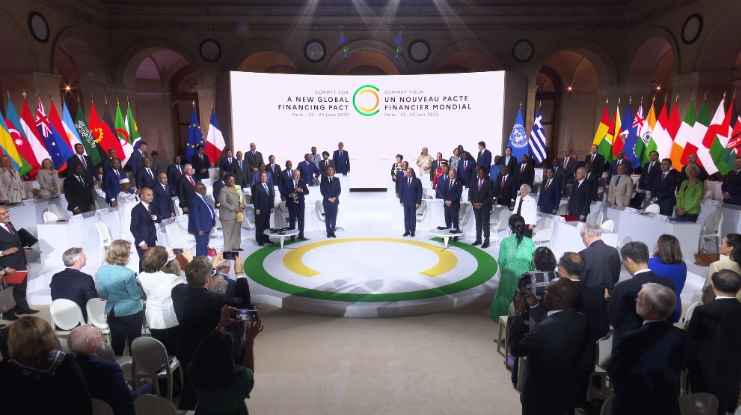The first official meeting of the new tax task force to raise additional finance for equitable climate and development action took place at the Head of State or Government’s Sherpa level in Washington DC last week.
The International Tax Task Force is led and co-chaired by Kenya, Barbados and France. It brings governments together to foster political will and advance options for international climate taxes, which could significantly contribute to closing the annual funding gap for developing and vulnerable countries (which experts estimate at 2.4 trillion by 2030).
This initiative arrives as a number of discussions among the international community highlight the importance of putting tax cooperation at the service of global public goods and development objectives. It also echoes calls from supporters of the Paris Pact for People and the Planet (4P), the Bridgetown Initiative and the Nairobi Declaration on Climate Change to leverage additional financing for these objectives.
At the meeting, the members endorsed a 2-year work plan for the task force to ensure all industries and people contribute to financing the fight against climate change, taking into account the pollution induced by their activities. With the work of the task force now fully underway, its members aim to put forward proposals and promote international agreements on one or several tax options at COP30 in autumn 2025.
These agreements can be implemented by relevant decision-makers, and by coalitions of countries ready to commit to implementing new tax options at the domestic level or in a relevant international forum, to generate more fairness and equity in the current global tax system.
The inaugural meeting in DC coincided with the International Monetary Fund (IMF) and World Bank Group’s Spring Meetings in the US capital. The founding members – Kenya, France, Barbados, Ireland, Spain, Antigua and the Marshall Islands – were joined at the meeting by a new member, Colombia.
The meeting was observed by the European Union, the IMF and the United Nations (UN). Membership of the task force currently has representation from around the world. Together, the members called on other interested countries to join the new initiative.
Ali Mohamed, Climate Change Envoy for Kenya and Sherpa to the task force, said: “The task force is keen to find practical solutions that raise much-needed financing to tackle climate change while having minimal impact on ordinary people. The goal is to develop innovative sources of financing that can be implemented by any country that wants to make a difference.”
Aurelien Lechevallier, Director General for Globalization at the French Ministry for European and Foreign Affairs and Sherpa to the task force, said, “The need for substantial, sustainable financial resources for countries to tackle climate change has never been more urgent. As a coalition of nations seeking ways to ensure we can meet our climate and development commitments now and into the future, the task force will collaborate to build political will among all governments and bring equitable, evidenced and workable solutions to COP30.”
Dr Arnold McIntyre, Principal Technical Advisor for the Government of Barbados and Sherpa to the task force said: “The new avenues of taxation that we will be exploring in the task force can be a powerful lever that, alongside traditional financing from governments, international financial institutions and the private sector, will unlock the necessary resources for climate adaptation and mitigation. Together we will be developing equitable proposals to apply levies targeting the most polluting sectors and individuals, with the aim of supporting the most climate-vulnerable people and countries who have contributed least to rising global greenhouse gas emissions. We look forward to meeting our fellow Heads of State and Government of the International Tax Task Force in the margins of the UN General Assembly to take stock of our collective progress.”
In addition, the task force will consider design options for each levy by taking a stocktake of existing levies already implemented in countries and conducting a literature review. This is ahead of launching impact studies in the summer to consider each levy’s potential based on revenue collection and distribution, national and international equity, economic and environmental impact, potential scale and politics.
The findings of these studies will include feasible and sensible options for international climate taxes that can easily be implemented. The first stocktake of this research will come in autumn 2024.
Professor Laurence Tubiana, CEO of the European Climate Foundation and the architect of the Paris Climate Agreement and Co-lead of the Secretariat of the International Tax Task Force, said: “Finding new ways to raise the billions needed to fight climate change effectively and equitably is a huge, but necessary task. Building on and complementing the important work done by bodies including the UN and the OECD, our task force will be looking for workable solutions for governments across the world. We’re inviting nations across the world, as well as stakeholders and experts, to engage with and input into our research, and we also expect to shortly announce my fellow co-lead of the task force’s secretariat.”
Each tax avenue under consideration could raise between 4 billion and 1 trillion annually for climate mitigation and adaptation through tactical interventions on major polluting sectors and individuals, according to some estimates. The taxes under consideration may include levies on fossil fuel levy, financial transactions, private air passengers, windfall fossil fuel profits, maritime fuel and a fossil fuel subsidy phase out. The potential revenue for each tax will be worked out in a rigorous research, analysis and consultation phase, through the impact studies.
The International Tax Task Force was established at COP28 by President Ruto, President Macron and Prime Minister Mottley, with the aim of mobilising finance at scale while bringing more equitable climate justice and fairness to our current financial system.
The task force has received the highest possible level of endorsement from the founding Heads of State and Government, and being launched at COP28. Its mandate builds on the Outcome of the Global Stocktake and complements other initiatives and complements other initiatives such as the soon to be finalised G20-OECD’s inclusive framework for the two-pillar global tax reform and the call for a UN Tax Convention.
Its work will include at least one meeting at Head of State and Government level ahead of COP30, and representation at international summits including COP29 in Baku, Azerbaijan, and the UN General Assembly in New York.
Read: IMF Economist Reveals Cause of Kenya’s Heavy Tax Burden
>>> Success Secrets of Taxi Lady Who Makes Sh7,000 Per Day








Leave a comment